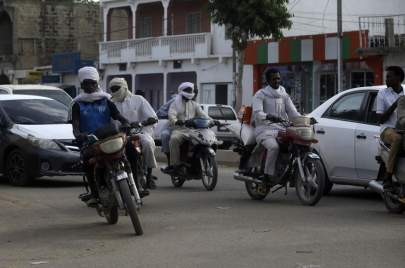Thousands demonstrate in Chad against military transition

N’DJAMENA, Chad (AP) - Thousands protested and two people were killed in Chad Tuesday in demonstrations against the rule of a transitional military council headed by the son of the late President Idriss Deby Itno, who died last week.
Those killed in violence surrounding the protests include a man shot dead in Moundou, in southern Chad, and another person who died in the capital, according to local reports.
The opposition coalition called for the demonstrations despite a ban on protests. Police fired tear gas to disperse protesters in Chad‘s capital, N’Djamena, and there were also demonstrations in other parts of the nation.
Demonstrators carried signs demanding that power be handed to civilians. The protesters also ransacked a gas station and burned tires throughout N’Djamena, where smoke covered some neighborhoods.
Authorities also detained several protesters and journalists. Many of the journalists were later released.
France and Congo strongly condemned “the crackdown on protests” in Chad and called for the end to all violence, in a joint statement issued Tuesday.
The presidencies of both countries expressed their support for an “inclusive transition process, open to all Chadian political forces, led by a civilian government” with the aim to organize elections within 18 months.
French President Emmanuel Macron and Congo President Felix Tshisekedi issued the statement following a meeting the two leaders had in Paris on Tuesday.
France and Congo also reaffirmed their “attachment to Chad’s stability and integrity.”
Chad’s military announced April 20 that Deby had been mortally wounded during a visit to the troops north of the capital, who were battling an anti-Deby rebel group. The announcement of Deby’s death came just hours after he had been confirmed the winner of presidential elections held earlier in April.
The military then appointed a council to lead an 18-month transition to new elections, putting Deby’s 37-year-old son Mahamat Idriss Deby in charge of Chad in the first change of power in more than three decades.
The appointment of the younger Deby provoked an immediate outcry from both Chad‘s political opposition and the rebel forces blamed for his father’s assassination. Those rebels have threatened to attack the capital, as the military transitional government says it will not negotiate with them.
As the new military transitional leader, Deby gave his first official address Tuesday.
Deby paid tribute to his father, saying his death left the country in “disarray, distress, and indescribable pain,” and that his late father gave his life “to preserve Chad from the threat of terrorist groups” and supporters of war.
Mahamat Deby said that faced with the threat of instability, the defense and security forces had no choice but to form a Transitional Military Council.
He said the council was set up to “face the absolute urgency of having to defend our country against the aggression it is facing, to preserve the gains of peace and stability and to guarantee unity and national cohesion.” He assured that the council had no other objective than to “ensure the continuity of the state, the survival of the nation and to prevent it from sinking into” violence and anarchy.
He called on Chad’s citizens to “silence resentments and misunderstandings, transcend selfish interests and overcome divisions to focus on the essential, the best interests of Chad. No state can prosper in an environment marked by disorder, anarchy, and chaos. No country can advance on the path of progress if hatred is the daily bread of its daughters and sons.”
He also reassured Chad’s allies that the country will maintain its responsibilities in the fight against extremism and respect all of its international commitments.
Photo: People travel during rush hour in N'Djamena, Chad, Monday, April 26, 2021. Chad's military transitional government said Sunday it will not negotiate with the rebels blamed for killing the country's president of three decades, raising the specter that the armed fighters might press ahead with their threats to attack the capital. (AP Photo/Sunday Alamba)
Link: https://www.washingtontimes.com/news/2021/apr/27/thousands-demonstrate-in-chad-against-military-tra/











